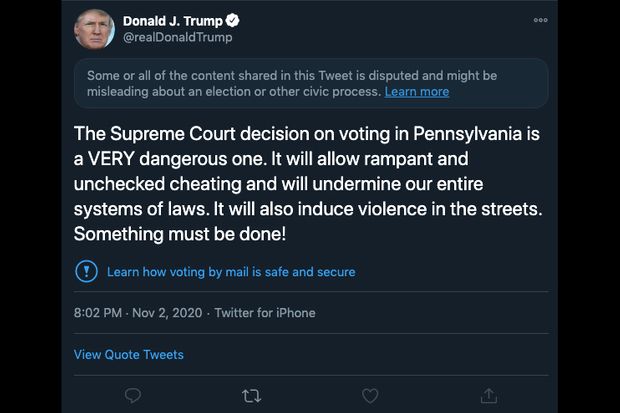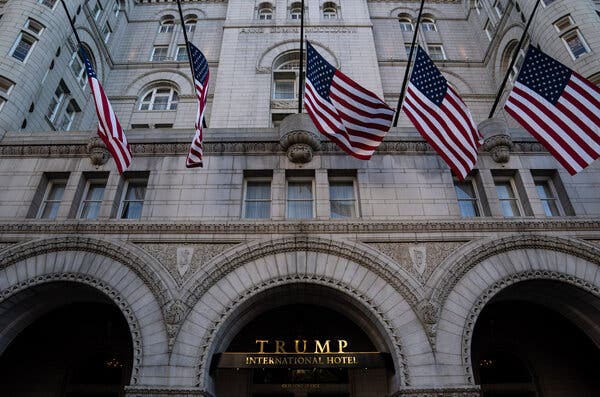
President-elect Joseph R. Biden Jr. and Vice President-elect Kamala Harris speak outside the Chase Center on Saturday Nov. 7 2020
Photographer: Erin Schaff/The New York Times
At age 77, President-elect Joseph R. Biden Jr. waited a long time to give the acceptance speech he delivered in Delaware on Saturday, Nov. 7. Biden trotted down a runway to an explosion of car horns and cheers, beaming and surprised by the ovation. This moment has been 48 years in the making since he was first elected to the Senate. Throughout the duration of Biden’s career in politics, he has run for president three times. Now, the day he has worked so hard for has finally come; his moment to be announced as the next president-elect has arrived.
According to the New York times, the president-elect invoked his own spirituality and shared credit for the moment with both his supporters and staff. He even quoted a hymn from “On Eagle’s Wings;” thanking voters, he professed, “I owe you, I owe you, I owe you everything.” Biden warmly praised Kamala Harris, his running mate, celebrating the fact that she would not only be the first woman, but also the first woman of color, to serve as vice president, stating, “It’s long overdue, and we’re reminded tonight of all those who fought so hard, for so many years to make this happen.”
Biden’s win was celebrated on a global scale, from dancing in the streets in Biden’s ancestral home in West Ireland, fireworks in Edinburgh and London, to a grand finale of ringing church bells in Paris. A sigh of relief and blessings of congratulations were in order.
The celebration was soon over when Vogue reported that President Donald J. Trump refused to give a concession speech — the only candidate in history to do so. In the days leading up to the official call of the election on Saturday, Biden crossed the 270 Electoral College vote threshold and recorded 75 million popular votes, the most of any candidate in American history. The record-breaking milestone was overshadowed when the Trump campaign filed about a dozen new lawsuits challenging the vote-counting process or batches of what he called “surprise ballots” with more expected to come, according to Time Magazine.

Trump’s lawyer, Rudy Giuliani, alleged without any evidence that the electoral system in Philadelphia was riddled with fraud. Soon after, the Trump campaign began bombarding states and federal courts with roughly a dozen new lawsuits, attempting to halt the vote-counting process or disqualify the tranches of ballots. The majority of the Trump campaign’s lawsuits were filed in Pennsylvania, Nevada, Georgia and Michigan — states where either Biden’s margin of victory was relatively slim or where a winner wasn’t officially declared on election night, Time Magazine reports.
Trump refused to concede until all the votes were counted and all concerns with fraud were addressed. On Sunday, Nov. 15, Trump posted a claim to Twitter, “We won’t let a RIGGED ELECTION steal our Country!” In a tweet now removed, Trump claimed that Biden won because he and the Democrats “cheated,” stating there is a lot of evidence documenting the occurrence of widespread fraud during the presidential elections in the states of Michigan, Pennsylvania, Georgia and elsewhere.
Trump added that “He [Biden] won because the Election was Rigged. NO VOTE WATCHERS OR OBSERVERS allowed, vote tabulated by a Radical Left privately owned company, Dominion, with a bad reputation & bum equipment that couldn’t even qualify for Texas (which I won by a lot!), the Fake & Silent Media, & more!”

“All of the mechanical ‘glitches’ that took place on Election Night were really THEM getting caught trying to steal votes. They succeeded plenty, however, without getting caught. Mail-in elections are a sick joke!” he tweeted.

The Guardian reports that the major Ohio-based law firm Porter Wright Morris & Arthur withdrew from the Trump campaign case filed in Pennsylvania seeking to have mail-in ballots thrown out. This was the latest blow to the president’s efforts to challenge the 2020 election results claiming voter fraud as having a major impact on his bid for reelection. Business Investigations Editor for the New York Times David Enrich tweeted on Friday, Nov. 13 that Porter Wright Morris & Arthur originally brought a suit alleging the use of mail-in ballots created “an illegal two-tiered voting system” in the state. However, they abruptly withdrew from that case in a memo to the court. The firm declined to address questions from news outlets about the case.
Separately, lawyers for the Trump campaign withdrew a lawsuit in Arizona, conceding that the case would not move enough votes to change the election result in the state. “Since the close of yesterday’s hearing, the tabulation of votes statewide has rendered unnecessary a judicial ruling as to the presidential electors,” Trump lawyer Kory Langhofer told an Arizona state court, first reported by the Wall Street Journal.
According to ABC 13 Eyewitness News, a second firm, Jones Day, said it was not representing the Trump campaign but instead the Pennsylvania GOP in litigation before the U.S. Supreme Court over the three-day extension to accept mail-in ballots. Nationally, the strategy is being run by Trump allies such as Giuliani, political operative; David Bossie, who is not an attorney; and Jay Sekulow, a lead lawyer during the president’s impeachment trial this year.
Trump’s claims of voter fraud have become so ramped that Time Magazine had to make a report on a coalition of federal and state officials, releasing a statement on Thursday, Nov. 12, reassuring the masses that they have no evidence votes were compromised or altered in the presidential election. The statement serves as a rejection of unsubstantiated claims of widespread fraud advanced by the president and his supporters.
In a statement released to the Cybersecurity and Infrastructure Security Agency (CISA) website by government and industry officials who coordinate election cybersecurity, they state the Nov. 3 election as “the most secure in American history.” This is the most direct repudiation to date of Trump’s efforts to undermine the integrity of the election process and echoed repeated assertions by election experts and state officials that the election went smoothly without broad irregularities.
So, what happens if Trump chooses not to leave the White House?
Conservative lawyer John Yoo is among the latest legal voices to weigh in on the matter and raise doubts about Trump’s attempts to reverse the result of the 2020 election with claims of voter fraud.
“He has the right to mount legal challenges, but we should be clear that these are ‘Hail Mary’ passes we might think of in American football,” Yoo, a former legal advisor to the George W. Bush administration, told CNBC’s “Capital Connection” on Thursday, Nov 12.
The Trump campaign relying on court challenges to overturn what is now a projected victory for president-elect Biden is a waste of time and money. Even if the Trump campaign can prove fraud or show that ballots were improperly cast in some cases, it is far from clear that the campaign will be able to invalidate enough of the tens of thousands of ballots necessary to erase Biden’s margin of victory in any state.
According to CNBC, the longest contested presidential election was in 2000 when it took 35 days before Democratic Vice President Al Gore conceded to George W. Bush, the Republican nominee. But that delay was the result of a dispute over ballots in just one state — Florida. Prior to Friday, Nov. 13, Biden was both the projected and declared winner in all the states listed in the disputes, including Georgia.
On Wednesday, Nov. 11, Georgia Secretary of State Brad Raffensperger said the state will conduct a by-hand recount of the votes in each county.

Photographer: Zach Gibson/The New York Times
Biden has received at least 279 Electoral College votes — nine more than the minimum needed to secure a White House victory. He could get 27 more after the New York Times declared him the winner in Arizona and if he picks up Georgia following the recount.
Yoo makes it clear that there is no argument that enables the president to sidestep the Constitution once his term has ended as decided by the states’ electoral votes.
He then offered an answer to the question many have been asking: What if Trump refuses to ever concede?
“He may never concede; he doesn’t have to concede,” Yoo said. “The thing about the American Constitution is that it doesn’t actually require the sitting president to do anything one way or the other. On January 20th, Donald Trump’s term ends and Joe Biden’s, I believe, will begin.”
According to the 20th Amendment to the Constitution, the candidate with the most electoral votes becomes president at noon on Jan. 20. The current president’s term is, therefore, over on that day. “And yeah, he could say ‘I’m not leaving, I’m not conceding’ — but at that time at noon on January 20, he’s no longer the president,” Yoo said, “and all of the allegiance of the government, of the military, of the civil service, switches to the winner of the November 3 election.”
So far, there’s no substantial evidence of voter fraud that would stand up in court. Government and election security officials have released rebuttals to the president’s unfounded claims. Biden has received the much needed electoral votes to be declared the next president-elect. So, why is Trump blocking a peaceful transfer of power?
Is he buying time to rebuild his personal brand?
According to the New York Times, Trump has privately raised the idea of running again in 2024, which could have a chilling effect on his business in the following years. Donald Trump Jr. and Ivanka Trump may also hold future political aspirations that could curb some plans for growth in the Trump family franchise. The Business Insider reports Trump is masterminding a leadership political action committee that will be permitted to accept donations of up to $5,000 a year from an unlimited number of people. This committee could help him retain control over the Republican Party after he leaves office, according to The New York Times.

The Trump International Hotel in Washington.
Photographer: Anna Moneymaker/The New York Times
Denied a second term by voters, Trump may now seek to return to a once-lucrative career in television. His family business will also be free to make up for lost time by once again looking overseas, where hotels and golf clubs helped drive its growth before his election in 2016. The New York Times also reports preliminary discussions about acquiring or starting a Trump-branded network, giving paid speeches and a book deal could also await him.
The fastest way for the Trump Organization to raise money is to flip the switch on its international deal machine, licensing the Trump name to real estate projects like hotels and residential towers. When Trump entered the White House in 2017, Trump Organization executives said the company had left behind more than two dozen such branding deals, including in China, Israel and South America.
Is he facing legal actions?
Trump could possibly be holding onto the presidency out of the fear of facing impending indictments. The New York Times reports that the Manhattan district attorney’s office is investigating Trump and his company for an array of potential financial crimes and is seeking his tax returns. The New York State attorney general’s office is conducting a separate civil inquiry into suspicions that the company misstated its assets. The company has denied any wrongdoing, but it may be reluctant to provide the investigators with additional deals to scrutinize.

Photographer: Bridget Bennett/The New York Times
Maybe he’s actually broke.
Forbes Magazine reports that, based on a review of two decades of Trump’s personal and corporate tax record, ranging from his days as a high-profile real estate developer to the beginning of his tenure as president, it paints a picture of a president whose business interests are in financial distress and looming money challenges could push him into bankruptcy in the near future.
The Times added that with struggling properties, vast write-offs, an audit battle and hundreds of millions in debt, the records show a significant gap between what Trump has said to the public and what he has disclosed to federal tax authorities over many years. Trump paid $750 in federal income taxes the year he won the presidency. In his first year in the White House, he paid another $750. Trump paid no income taxes at all in 10 of the previous 15 years largely because he reported losing much more money than he made. His finances are under stress and he’s dealing with a decade-long audit battle with the Internal Revenue Service over the legitimacy of a $72.9 million tax refund that he claimed, and received, after declaring huge losses. An adverse ruling could cost him more than $100 million.
Some of Trump’s most lucrative properties are in Democratic strongholds like New York and Chicago, where he remains deeply unpopular. And his biggest revenue-generator, his Doral golf resort in Florida, has suffered from a drop-off in conference revenue as some big companies and organizations stayed away because of his divisiveness. Trump has tried to fill the gap, in part, through events booked at his properties by groups connected to him and Republican politics. It is unclear if that patronage will continue, or if Trump’s detractors will return to his properties.
Trump is doing everything possible to block the transition of power so that he doesn’t have to deal with the legal issues that await him as a private citizen in January 2021. The baseless allegations of fraudulent voting, the secret meetings with Republican officials, combined with the attempts to delegitimize voting results from key battleground states like Georgia, Pennsylvania and Michigan (mainly that of Black voters) are nothing more than short attempts to buy him the time needed to avoid prosecution. Trump is not only undermining the legitimacy of American democracy, but he has demonstrated to the American people, who have spoken with their votes, that he cares nothing about our democratic system (unless it works in his favor) and that he completely disregards the American Constitution.


